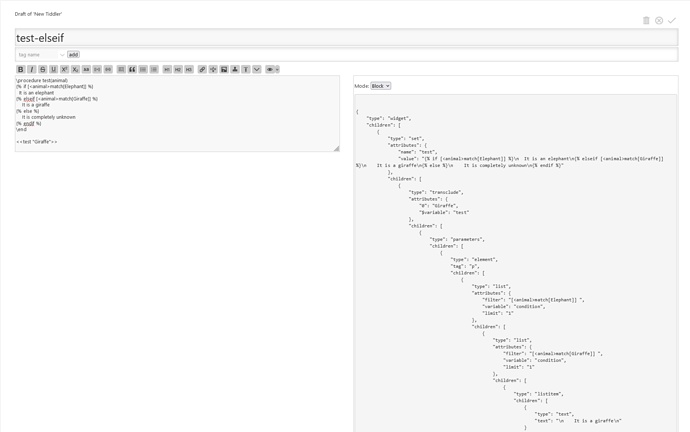Good question. The challenge with using the widget based syntax is that it is verbose and finickity. For example, every “if” widget will need the characters filter=... repeated, and every widget needs to be explicitly closed.
For example, here is an example of the widget-based syntax:
\define num() 2
<$if filter="[<num>compare:number:gt[3]]">
<$then><<num>> is greater than 3</$then>
<$elseif filter="[<num>compare:number:gt[2]]"><<num>> is greater than 2</$elseif>
<$elseif filter="[<num>compare:number:gt[1]]"><<num>> is greater than 1</$elseif>
<$elseif filter="[<num>compare:number:gt[0]]"><<num>> is greater than 0</$elseif>
<$else><<num>> is negative or zero</$else>
</$if>
That’s a total of 397 characters. In contrast, the same example using the proposed shortcut syntax is 319 characters, and is much easier to read:
\define num() 2
{% if [<num>compare:number:gt[3]] %}
<<num>> is greater than 3
{% elseif [<num>compare:number:gt[2]] %}<<num>> is greater than 2
{% elseif [<num>compare:number:gt[1]] %}<<num>> is greater than 1
{% elseif [<num>compare:number:gt[0]] %}<<num>> is greater than 0
{% else %}<<num>> is negative or zero
{% endif %}
The roots of this proposal have been in my thoughts for a long time. There are many discussions over the years where I have advocated for the general principle of introducing shortcut syntaxes to more concisely express common idioms that can be done with raw widgets, but this is the first time we have a first firm proposal in that area.
A “shortcut syntax” means a special parse rule that matches instances of a particular syntactic construction. It has to be independent of the existing rules, so we can’t reuse the existing syntax markers << and <$, but need to choose a new way to mark not just these conditional operations, but also future shortcut syntaxes.
As @rmunn notes, a switch/case shortcut syntax would be very helpful and could be readily expressed using a similar shortcut syntax:
{% switch [<myvalue>] %}
{% case "one" %}
Something
{% case "two" %}
Another
{% default %}
More
{% endswitch %}
It’s a big step to introduce such a fundamental new feature, but I think would open the door to further improvements that together would greatly improve the expressiveness and readability of wikitext. A new character sequence like {% is bound to look strange and out of place to all of us familiar with the existing syntax, but it is entirely complementary to the existing syntax, and deals with different situations.



